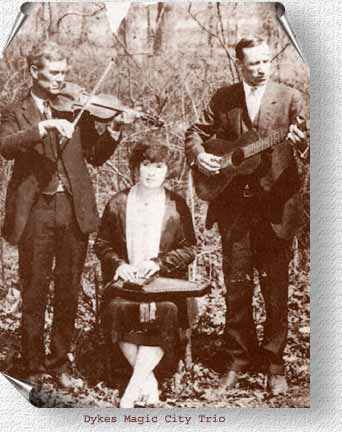Annotation:Tennessee Girls: Difference between revisions
No edit summary |
No edit summary |
||
| Line 1: | Line 1: | ||
{{TuneAnnotation | {{TuneAnnotation | ||
|f_annotation='''TENNESSEE GIRLS/GAL.''' American, Reel (cut time). USA, east Tennessee. D Major. Standard tuning (fiddle). AB (Silberberg): AABBBB (Phillips). Musicologist and country music researcher Charles Wolfe called "Tennessee Girls" "a familiar east Tennessee tune". The reel was recorded in New York in 1927 on a Brunswick Records 78 RPM by the east Tennessee group the Dykes Magic City Trio (fiddler John Dykes was probably playing in the key of D, although the recording sounds in C, either because he tuned down or from a faulty recording process). Doug Dorschug (ex-Highwoods String Band), who has collected and played autoharps from that time period, believes that Magic City Trio band member Myrtle Vermillion’s autoharp only played in C and F, requiring the fiddle to be tuned a step down if the ‘D’ fingering position was to be used. The recording features called prompts for a square dance by the guitar player for the band, G.H. "Hub" Mahaffey. | |f_annotation=[[File:dykes.jpg|400px|thumb|right|Dykes' Magic City Trio]]'''TENNESSEE GIRLS/GAL.''' American, Reel (cut time). USA, east Tennessee. D Major. Standard tuning (fiddle). AB (Silberberg): AABBBB (Phillips). Musicologist and country music researcher Charles Wolfe called "Tennessee Girls" "a familiar east Tennessee tune". The reel was recorded in New York in 1927 on a Brunswick Records 78 RPM by the east Tennessee group the Dykes Magic City Trio (fiddler John Dykes was probably playing in the key of D, although the recording sounds in C, either because he tuned down or from a faulty recording process). Doug Dorschug (ex-Highwoods String Band), who has collected and played autoharps from that time period, believes that Magic City Trio band member Myrtle Vermillion’s autoharp only played in C and F, requiring the fiddle to be tuned a step down if the ‘D’ fingering position was to be used. The recording features called prompts for a square dance by the guitar player for the band, G.H. "Hub" Mahaffey. | ||
|f_source_for_notated_version=John Dykes (<span>c. 1882-1940's)</span>(Milliner-Koken); Ron Kane with the Deseret String Band [Phillips]; Forrest Carroll [Silberberg]. | |f_source_for_notated_version=John Dykes (<span>c. 1882-1940's)</span>(Milliner-Koken); Ron Kane with the Deseret String Band [Phillips]; Forrest Carroll [Silberberg]. | ||
|f_printed_sources=Clare Milliner & Walt Koken ('''Milliner-Koken Collection of American Fiddle Tunes'''), 2011; p. 651. Phillips ('''Traditional American Fiddle Tunes, vol. 1'''), 1994; p. 238. Silberberg ('''Tunes I Learned at Tractor Tavern'''), 2002; p. 157. | |f_printed_sources=Clare Milliner & Walt Koken ('''Milliner-Koken Collection of American Fiddle Tunes'''), 2011; p. 651. Phillips ('''Traditional American Fiddle Tunes, vol. 1'''), 1994; p. 238. Silberberg ('''Tunes I Learned at Tractor Tavern'''), 2002; p. 157. | ||
Revision as of 20:28, 7 July 2021
X:1 T:Tennessee Girls N:From the playing of fiddler John Dykes () with his family band, N:the Dykes Magic City Trio. M:C| L:1/8 R:Reel Q:"Fast" D:Brunswick 120 (78 RPM), Dykes Magic City Trip (1927) D:https://www.slippery-hill.com/content/tennessee-girls Z:Andrew Kuntz K:D ([DA]|d)efd e2e2|defd ecee|defd efed|BA2 A2(3A/B/c/| d)efd AAA2|defd A2Bc|defd A2 Ad|B2A2A2((3ABc| d)efd cdec|defd e3e| deff e2ed | B2A2A2Ac| defd ecee|defd e3e|defd efed|B2A2A2|| |:Ac|d2f-a a2ba|f2a2a2fe|d2fa a2 ba|f2d2 e4| d2 (fa) a2 ba|f2a2e2d2|fafe d2ee|B2A2A2:|]


